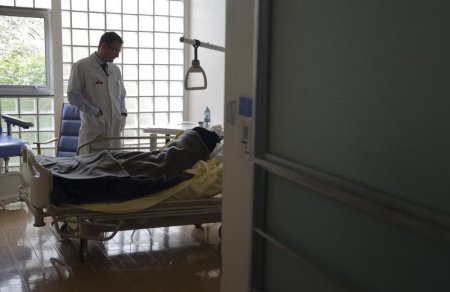Breaking COVID-19 lockdown for assisted suicide is OK, UK Heath Secretary says

Despite the British government's strict lockdown rules prohibiting travel abroad, people seeking physician-assisted suicide or euthanasia will be allowed to travel, Health Secretary Matt Hancock said.
Hancock told members of Parliament on Friday that flying to the Dignitas clinic in Switzerland would be a "reasonable excuse" under the travel ban, which went into effect on Thursday, The Telegraph reported.
"The new coronavirus regulations place restrictions on leaving the home without a reasonable excuse. Traveling abroad for the purpose of assisted dying is a reasonable excuse, and so anyone doing so would not be breaking the law," Hancock said.
"The question of how we best support people in their choices at the end of their life is a complex moral issue that, when considered, weighs heavily upon us all."
Regulations on travel ban Brits from traveling domestically, elsewhere in the U.K. or abroad with exceptions for work, education, "or other legally permitted reasons," The Telegraph added.
Hancock emphasized, however, that encouraging or assisting someone in their death remains a criminal offense.
"I think it is right that we locate this question within a broader discussion of how we care for people at the end of their lives which has become sadly — due to the coronavirus pandemic — a central issue of public debate in this country," Hancock added.
Hancock's comments were in response to a member of Parliament who raised concerns that the new regulations on travel might deter people from traveling to obtain an assisted death, in countries where it's legal, such as Switzerland.
Sarah Wootton, chief executive of Dignity in Dying, a pro-assisted suicide and euthanasia group, said that COVID-19 has "proven what we have long known, that banning assisted dying does not protect people; it merely drives the practice overseas and underground and criminalizes acts of genuine compassion."
"Parliamentarians must step up and grasp this nettle. Gathering evidence on what is really going on under the ban on assisted dying can only help them in that task, and a review of the functioning and impact of our current law would give terminally ill Brits and their loved ones a much-needed voice in this debate."
The group is presently pushing for a bill in Parliament that would allow those who are terminally ill to end their lives with medical assistance.
By contrast, opponents of euthanasia and assisted suicide, such as the Care Not Killing Alliance and Not Dead Yet, warn that making the practice legal places pressure on vulnerable groups, such as the elderly, sick, and infirm to end their lives.
Fiona Bruce, a conservative member of Parliament, said now is not the right time to discuss policy changes on assisted death, given the circumstances the pandemic has caused.
“At this time, when the whole country is making huge sacrifices to protect life, at a time of exceptionally high levels of physical and mental stress, and when many people may feel very vulnerable ... that it would be completely inappropriate — indeed, insensitive — of this Parliament to go anywhere near considering making access to any form of suicide easier,” she said, according to the Catholic News Agency.
Hancock's clarification comes on the heels of an Oct. 17 referendum in New Zealand in which voters overwhelmingly approved legalizing euthanasia nationwide. The results of that vote were certified Friday and the policy will go into effect on Nov. 6, 2021.





















